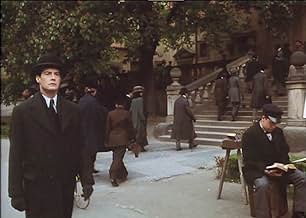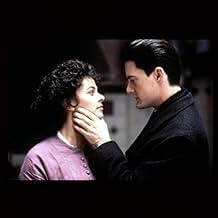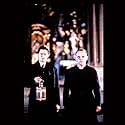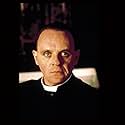Joseph K. (Kyle MacLachlan) awakens one morning to find two strange men in his room, telling him he has been arrested. Joseph is not told with what he is charged, and despite being "arrested... Read allJoseph K. (Kyle MacLachlan) awakens one morning to find two strange men in his room, telling him he has been arrested. Joseph is not told with what he is charged, and despite being "arrested" is allowed to remain free and go to work. But, despite the strange nature of his arrest,... Read allJoseph K. (Kyle MacLachlan) awakens one morning to find two strange men in his room, telling him he has been arrested. Joseph is not told with what he is charged, and despite being "arrested" is allowed to remain free and go to work. But, despite the strange nature of his arrest, Joseph soon learns that his trial, however odd, is very real, and he tries desperately to... Read all
- Director
- Writers
- Stars
- Director
- Writers
- All cast & crew
- Production, box office & more at IMDbPro
Featured reviews
Or will he try to see to what he believes to be the true spirit of the work, and express it in a new way? After all, books and films are different medias and thinking of how much is lost without the author's special language and distinct style - for an example -, shouldn't a director try to make up for that loss by adding something unique for film?
I would go for the latter. Otherwise your filmversion of an essential piece of literary work will be just that: a version of an essential book, not an essential film in itself.
Of course this can cause a lot of controversy, and there's no doubt that some directors have managed to completely ruin an excellent book when trying to make 'their own' version of it. BUT, look for an example at 'A Clockwork Orange'. Burgess intricate play with language and manipulation of the reader - slowly taking him into Alex's world and way of thinking - simply will not be translated into film. So instead Kubrick used the unique opportunities of film and managed to combine the use of audio and vision to stunning effects. Kubrick managed to make something own out of it, no question about it.
And that's what I feel is missing in 'The Trial'. Yes, it is a perfectly well-done job. I couldn't think of a more suitable actor for Josef K than Kyle 'Agent Dale Cooper' MacLachlan: that's EXACTLY the way I envisioned him when reading the novel! Also the settings in Prague provides the movie with beautiful and suitable backgrounds. Though some scenes, for lengths sake, has been cut short it also stays true to the events in the novel and manages to catch some of the atmosphere in the novel.
The movie is carried through very competent, the actors are talented and there's a a nice 'Godfather'-esque grainish color on top of it all. No, this isn't a bad movie. On the contrary!
But why shouldn't I rather read on the novel myself? Because what is really comes down to is this: if a translation from one media to another is to be successful, it can never be just a translation. It has to stand on it's own legs.
And that's where this film fails. We aren't offered any new perspectives or different ideas on Josef K and his torments. Quite simply, it's an enjoyable watch but probably holds appeal mostly to those who don't have the time or interest to read the novel instead.
6/10
The screenplay follows Kafka's novel well in text and feel. Well enough, if fact, that reading the novel will offer little more than this film's relating of the story of Joseph K. and his trial. And that is the best that a film version of a novel can possibly hope for.
To anyone that has taken time to read it or any small part of it, Kafka's body of work does not readily lend itself to film adaptation. His fiction is savagely personal, and so the vast majority plays out in the minds of the central characters rather than through action or dialogue. And when there is dialogue, it is subtly understated, absurdly simplistic, powerful and surreal. His novels were his nightmares, and in writing they became our nightmares, imagining his quiet and steady suffocation and contemplating our own. Committing true horror to film is difficult by any standards, and this film fails outright.
It lacks the brutal eeriness that Kafka relates. It lacks the finesse of Kafka's words. It lacks the expressive thought that is instrumental in deciphering his protagonist. It lacks all but Kafka's story (and his name), and this story is really too simple. The nuances of the language never emerge and any lingering boldness is soon lost in boredom. To translate Kafka into English requires passion and true understanding; to translate Kafka to another medium requires nothing less than inspiration, and this director and his cast lack it entirely.
If you want a well-realized, true-to-Kafka film, find American animator Caroline Leaf's "The Metamorphosis of Mr. Samsa" or Orson Welles' adaptation of this same novel, or even Rudolph Noelte's 1971 version of "The Castle."
So I was very eager to see The Trial brought to the screen.
And I can tell you from this film fan's perspective, this movie was the real deal. Filmed in Kafka's home city of Prague, it shows the world that Kafka knew.
Exploring the life and spiraling downfall of Josef K., a young bank executive, it shows a nightmarish world in which a man is destroyed slowly and gradually.
It is a timeless story about being entrapped in a horrible bureaucracy in which there is no escape.
Josef K is visited by two roguish officers of the court and summoned to a bizarre court. The court comes to regular meetings and he is summoned throughout the story. He goes through the entire proceedings not knowing even what crimes he is being charge with.
The bizarre "court" is a cavernous building where families, children, adulterous spouses and bullying thugs inhabit. Everyone inside seems to have a function yet we never see the judges or those who are responsible for the fate of the story's protagonist.
In the meantime he continues to live is normal, dull life.
But the court continues to rule his life. And the harder he fights the court the more deeply entrenched he becomes.
Students of Kafka's literature will recognize the familiar themes: man against an inhumane bureaucracy, the eminant demise of man, the demise of freedom at the expense of rules and regulations, the literal use of metaphores and the ultimate doom of all humanity.
Its not your average story but for those who are seeking something different I would heartily recommend it.
Did you know
- TriviaKarel Reisz was asked to direct.
- ConnectionsFeatured in Screen Two: The Trial (1993)
- How long is The Trial?Powered by Alexa
Details
- Release date
- Country of origin
- Official site
- Language
- Also known as
- El proceso de Kafka
- Filming locations
- Production companies
- See more company credits at IMDbPro
Box office
- Gross US & Canada
- $119,267
- Opening weekend US & Canada
- $14,854
- Nov 28, 1993
- Gross worldwide
- $119,267
- Runtime2 hours
- Color
- Aspect ratio
- 1.85 : 1
Contribute to this page


































